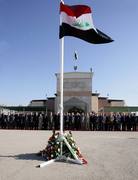 The latest State of Iraq update from the Brookings Institution in The New York Times confirms the security success of the surge—there have been fewer civilian deaths in Iraq this past February than in any since the war started. Now, the argument moves to whether Iraqi politicians are capable of taking advantage of the space created by the surge.
The latest State of Iraq update from the Brookings Institution in The New York Times confirms the security success of the surge—there have been fewer civilian deaths in Iraq this past February than in any since the war started. Now, the argument moves to whether Iraqi politicians are capable of taking advantage of the space created by the surge.
It is clear that national reconciliation in Iraq remains a considerable way off. But it would be wrong to dismiss the definite signs of progress we have seen on this front recently. As the report notes, “The most intriguing area of late is the sphere of politics. To track progress, we have established “Brookings benchmarks” — a set of goals on the political front similar to the broader benchmarks set for Baghdad by Congress last year. Our 11 benchmarks include establishing provincial election laws, reaching an oil-revenue sharing accord, enacting pension and amnesty laws, passing annual federal budgets, hiring Sunni volunteers into the security forces, holding a fair referendum on the disputed northern oil city of Kirkuk, and purging extremists from government ministries and security forces.
At the moment, we give the Iraqis a score of 5 out of 11 (our system allows a score of 0, 0.5, or 1 for each category, and is dynamic, meaning we can subtract points for backsliding). It is far too soon to predict that Iraq is headed for stability or sectarian reconciliation. But it is also clear that those who assert that its politics are totally broken have not kept up with the news.” If this progress can be built on over the summer, then there is a real chance that we could begin to see Iraq emerge as a functioning, pluralistic state. Success in Iraq is still a long way off, but it is becoming an increasingly possible outcome.







Comments